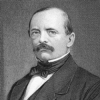Otto von Bismarck

Otto von Bismarck
Otto Eduard Leopold, Prince of Bismarck, Duke of Lauenburg, known as Otto von Bismarck, was a conservative Prussian statesman who dominated German and European affairs from the 1860s until 1890. In the 1860s he engineered a series of wars that unified the German states, significantly and deliberately excluding Austria, into a powerful German Empire under Prussian leadership. With that accomplished by 1871 he skillfully used balance of power diplomacy to preserve German hegemony in a Europe which, despite many disputes...
NationalityGerman
ProfessionPolitician
Date of Birth1 April 1815
CitySchonhausen, Germany
CountryGermany
The government should cultivate the view also among the propertyless classes of the population, those who are the most numerous and the least educated, that the state is not only an institution of necessity but also of welfare. By recognizable and direct advantages they must be led to look upon the state not as an agency devised solely for the protection of the better-situated classes of society but also as one serving their needs and interests.
What we learn from History is that no one learns from History
The division of the United States into federations of equal force was decided long before the Civil War by the high financial powers of Europe. These bankers were afraid that the United States, if they remained in one block and as one nation, would attain economic and financial independence, which would upset their financial domination over the world. The voice of the Rothschilds prevailed... Therefore they sent their emissaries into the field to exploit the question of slavery and to open an abyss between the two sections of the Union.
Do not expect that once taking advantage of Russia's weakness, you will receive dividends forever. Russian has always come for their money. And when they come - do not rely on an agreement signed by you, you are supposed to justify. They are not worth the paper it is written. Therefore, with the Russian is to play fair, or do not play.
Only a fool learns from his own mistakes. The wise man learns from the mistakes of others.
People never lie so much as after a hunt, during a war or before an election.